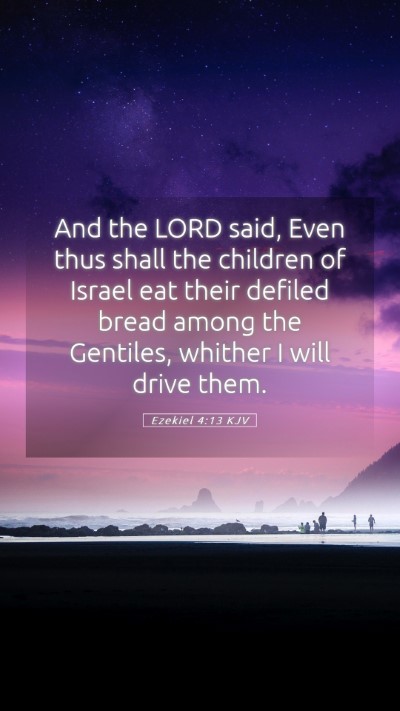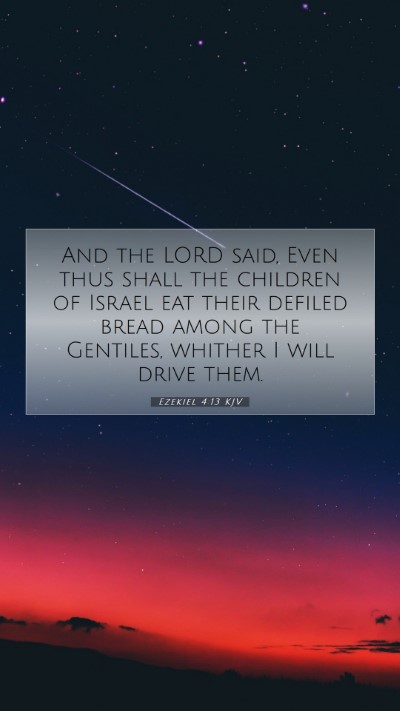Bible Verse Meaning: Ezekiel 4:13
The verse Ezekiel 4:13 states: "And the LORD said, Even thus shall the children of Israel eat their defiled bread among the Gentiles, whither I will drive them." This verse serves as a profound illustration of the children of Israel's imminent exile and their spiritual state during captivity.
Contextual Background
Ezekiel was a prophet during the Babylonian exile. His mission was to communicate God's messages during a time when Israel was facing deep moral and spiritual collapse. The symbolism employed here, particularly the notion of 'defiled bread,' emphasizes not only the physical state of the Israelites but also their spiritual uncleanliness resulting from their disobedience to God.
Insights from Commentaries
Matthew Henry's Commentary
According to Matthew Henry, this verse underscores the severity of Israel's sin and impending judgment. The 'defiled bread' symbolizes the unclean and idolatrous practices that the Israelites would adopt in exile. It illustrates how the Israelites would be forced to assimilate into the Gentile cultures surrounding them, which was explicitly contrary to their identity as God’s chosen people.
Albert Barnes' Exposition
Albert Barnes elaborates on this verse by indicating that the 'defiled bread' represents the loss of spiritual purity and the degradation of their covenant relationship with God. His commentary expresses that during their exile, the Israelites would suffer not only physically but spiritually, as they would partake in different customs that would lead them further away from Yahweh.
Adam Clarke's Commentary
Adam Clarke emphasizes the historical implications of this prophecy. He suggests that the metaphor of 'defiled bread' can be seen as a warning about the consequences of disobedience to God's laws. Clarke notes that their enforced eating of the Gentiles' food reflects a deep loss of identity and the transformative trials they would face in Babylon.
Thematic Interpretations
This verse primarily illustrates several themes, including:
- Judgment and Consequence: The 'defiled bread' signifies the divine judgment that comes as a result of disobedience and idolatry.
- Exilic Experience: It paints a vivid picture of the Israelites’ life in exile and their struggle to maintain their identity amidst foreign influences.
- Spiritual Defilement: This verse addresses the consequence of turning away from God's commands, leading to spiritual contamination.
Application of Ezekiel 4:13
For *Bible study groups*, understanding Ezekiel 4:13 is crucial as it invites reflection on personal and communal practices of faith. Members can ask questions such as:
- In what ways might we be influenced by the surrounding culture contrary to our faith?
- How can we maintain spiritual purity in a secular world?
- What lessons can we learn from Israel's exile to strengthen our commitment to God today?
Related Bible Verses
To further explore the themes in Ezekiel 4:13, consider these related verses:
- Isaiah 43:2 - God's promise of protection and presence in trials.
- Jeremiah 29:10-11 - God's plans for His people, even in exile.
- Daniel 1:8 - Daniel's resolve to remain pure in a foreign land.
Conclusion
Ezekiel 4:13 serves as a stark reminder of the consequences of straying from God's path. The insights from public domain commentaries enrich our understanding of the text, inviting deeper engagement with its implications for modern believers. The verse illustrates a critical view on how God's people must navigate their faith amidst conflicting cultural influences while staying true to their identity in Him.
For anyone seeking Bible verse meanings, Bible verse interpretations, or Biblical exegesis, reflections based on this verse provide valuable insights that can be applied in our daily lives.


